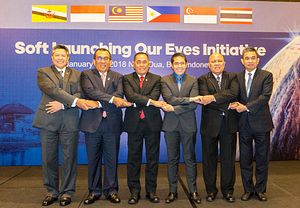Earlier this month, Indonesia’s defense minister invited European states to join in a new intelligence-sharing initiative. Though this is just the latest set of discussions on the new initiative, it nonetheless bears noting within the broader context of regional responses to countering terrorism and violent extremism in Southeast Asia and the world more generally.
As I have noted repeatedly in these pages, growing terrorism fears in Southeast Asia – made clear in attacks in several Southeast Asian countries, including Indonesia – have led states to take a range of steps on their own as well as bilaterally, regionally, and subregionally.
One of these moves is the “Our Eyes” initiative (OEI). OEI. The OEI, which derives its name from the “Five Eyes” intelligence network that the United States has with four Western allies, was officially proposed by Indonesian Defense Minister Ryamizard Ryacudu late last year as an information-sharing platform for member countries designed to facilitate the exchange of intelligence on terrorism, radicalism, and violent extremism.
The OEI was initially talked about as an initiative between Indonesia, Malaysia, and the Philippines, in line with wider trilateral cooperation (or “three eyes”). But discussions have since broadened to include wider subregional and regional meetings, including the ASEAN Defense Ministers’ Meeting, as well as invitations issued to other countries beyond Southeast Asia as well.
Last week, the Our Eyes initiative was in the headlines again with an invitation offered by Ryacudu for European states to join in. The invitation came in the context of Ryacudu’s visit to Europe, which occurred from October 12 to October 17 and saw him attend the Asia-Europe Counterterrorism Dialogue in Brussels, Belgium.
In his remarks at the Dialogue, Ryacudu repeated many of the points he has been making in other fora, including the importance of multilateral cooperation given the transnational nature of the threat and the need to focus on nonmilitary components of a counterterrorism approach, such as the use of soft power and changing the mindset of radicals. He also reinforced the need for concrete collaboration in areas such as intelligence exchange as part of a step-by-step process to establish a regional security architecture for counterterrorism.
But the headline-grabbing item in his remarks was his invitation for European states to join the Our Eyes Initiative. According to the Indonesian defense ministry’s official statement regarding Ryacudu’s engagements, Ryacudu said European states joining OEI would enhance international cooperation against terrorism and could potentially help prevent terrorist attacks in Europe.
The public accounts of Ryacudu’s proposal did not include much in the way of specifics, including how exactly this would work in terms of a timeframe and how the degree of receptivity on the European side could manifest itself into implementation in the coming months and years. Nonetheless, as the initiative continues to evolve within the wider context of regional and global counterterrorism responses and the nature of the terrorism threat, this angle will continue to be interesting to watch.
































